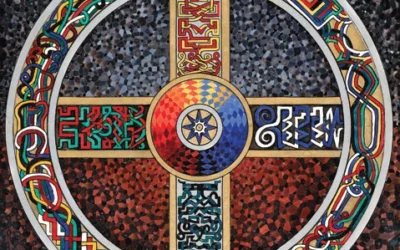Insights from Global Cultures on the Nature of Pain and Healing

What can therapy learn from ancient cultures?
Suffering is a universal human experience, yet the way we make meaning of our pain is profoundly shaped by our cultural context. By examining diverse philosophical and cultural perspectives on suffering, therapists can gain a deeper understanding of their clients’ lived experiences and develop more effective, empathetic approaches to treatment.
Western Philosophy:
Suffering as a Problem to be Solved In the Western philosophical tradition, suffering is often seen as a problem to be solved or eliminated. The Stoics believed that suffering arises from our attachments and that we can achieve peace by cultivating detachment and self-control (Epictetus, trans. 2014). Similarly, the Epicureans sought to minimize suffering by pursuing simple pleasures and avoiding pain (De Botton, 2001).
Existentialism:
Suffering as Inherent to the Human Condition Existential philosophers like Søren Kierkegaard (1849/1980) and Jean-Paul Sartre (1943/2003) viewed suffering as an inherent part of the human condition, arising from our confrontation with meaninglessness and the anxiety of freedom. For existentialists, suffering is not simply a problem to be solved but an opportunity for growth and self-transcendence.
Eastern Philosophy:
Suffering as a Path to Liberation In Eastern philosophical traditions, suffering is often seen as a gateway to spiritual awakening. Buddhism teaches that suffering arises from attachment and that liberation comes through letting go of desire and cultivating compassion (Hanh, 1998). Hinduism holds that suffering is a result of karma and that we can transcend it by realizing our true nature as divine consciousness (Easwaran, 2007).
Indigenous Perspectives:
Suffering as a Message from the Spirit World Many indigenous cultures view suffering as a message from the spirit world, indicating a need for healing or transformation. In some Native American traditions, illness is seen as a sign of imbalance or a call to embark on a spiritual quest (Mehl-Madrona, 2007). Similarly, in African cultures, suffering may be understood as a result of discord between the individual and the community or the ancestral realm (Some, 1998).
The Role of Meaning-Making in Coping with Suffering
Across cultures, the way we make meaning of our suffering has a profound impact on our ability to cope and heal. Viktor Frankl (1946/2006), a Holocaust survivor and psychiatrist, argued that finding meaning in suffering is essential to resilience and that even in the most extreme circumstances, we have the freedom to choose our attitude and response.
Cultural Empathy: Deepening Therapists’ Understanding
By studying diverse cultural perspectives on suffering, therapists can develop greater empathy and sensitivity to their clients’ unique experiences. This cultural empathy allows therapists to attune to the ways in which clients’ cultural backgrounds shape their understanding of their pain and their paths to healing (Comas-Díaz, 2012).
Integrating Cultural Wisdom into Psychotherapy
Therapists can draw upon the wisdom of different cultures to enrich their therapeutic approaches. This may involve incorporating mindfulness practices from Buddhism, exploring existential themes, or drawing upon indigenous healing rituals. By integrating cultural perspectives, therapists can create a more holistic and culturally-responsive approach to treatment.
The Importance of Cultural Humility
As therapists seek to learn from other cultures, it is essential to approach this learning with humility and respect. Cultural humility involves recognizing the limitations of one’s own perspective, being open to learning from clients, and continually examining one’s biases and assumptions (Hook et al., 2013). By embodying cultural humility, therapists can create a safe and affirming space for clients to explore their experiences of suffering.
Suffering is a universal human experience, but the way we make meaning of our pain is profoundly shaped by our cultural context. By studying diverse philosophical and cultural perspectives on suffering, therapists can deepen their empathy, broaden their therapeutic repertoire, and ultimately, provide more effective and culturally-responsive care. As we seek to alleviate suffering in our clients and ourselves, let us draw upon the wisdom of the world’s cultures, approaching this learning with humility, openness, and compassion.
References:
Comas-Díaz, L. (2012). Multicultural care: A clinician’s guide to cultural competence. American Psychological Association.
De Botton, A. (2001). The consolations of philosophy. Vintage.
Easwaran, E. (2007). The Bhagavad Gita. Nilgiri Press.
Epictetus. (2014). Discourses, fragments, handbook. (R. Hard, Trans.). Oxford University Press.
Frankl, V. E. (2006). Man’s search for meaning. Beacon Press. (Original work published 1946)
Hanh, T. N. (1998). The heart of the Buddha’s teaching: Transforming suffering into peace, joy, and liberation. Broadway Books.
Hook, J. N., Davis, D. E., Owen, J., Worthington, E. L., Jr., & Utsey, S. O. (2013). Cultural humility: Measuring openness to culturally diverse clients. Journal of Counseling Psychology, 60(3), 353–366.
Kierkegaard, S. (1980). The sickness unto death. (H. V. Hong & E. H. Hong, Trans.). Princeton University Press. (Original work published 1849)
Mehl-Madrona, L. (2007). Narrative medicine: The use of history and story in the healing process. Bear & Company.
Sartre, J.-P. (2003). Being and nothingness. (H. E. Barnes, Trans.). Washington Square Press. (Original work published 1943)
Some, M. P. (1998). The healing wisdom of Africa: Finding life purpose through nature, ritual, and community. TarcherPerigee.

























0 Comments